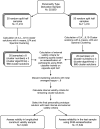Personality types revisited-a literature-informed and data-driven approach to an integration of prototypical and dimensional constructs of personality description
- PMID: 33411758
- PMCID: PMC7790254
- DOI: 10.1371/journal.pone.0244849
Personality types revisited-a literature-informed and data-driven approach to an integration of prototypical and dimensional constructs of personality description
Abstract
A new algorithmic approach to personality prototyping based on Big Five traits was applied to a large representative and longitudinal German dataset (N = 22,820) including behavior, personality and health correlates. We applied three different clustering techniques, latent profile analysis, the k-means method and spectral clustering algorithms. The resulting cluster centers, i.e. the personality prototypes, were evaluated using a large number of internal and external validity criteria including health, locus of control, self-esteem, impulsivity, risk-taking and wellbeing. The best-fitting prototypical personality profiles were labeled according to their Euclidean distances to averaged personality type profiles identified in a review of previous studies on personality types. This procedure yielded a five-cluster solution: resilient, overcontroller, undercontroller, reserved and vulnerable-resilient. Reliability and construct validity could be confirmed. We discuss wether personality types could comprise a bridge between personality and clinical psychology as well as between developmental psychology and resilience research.
Conflict of interest statement
The authors have declared that no competing interests exist.
Figures



References
-
- Costa PT, Herbst JH, McCrae RR, Samuels J, Ozer DJ. The replicability and utility of three personality types. European Journal of Personality. 2002;16(S1):S73–S87.
-
- Herzberg PY. Beyond “accident-proneness”: Using Five-Factor Model prototypes to predict driving behavior. Journal of Research in Personality. 2009;43(6):1096–100.
-
- Steca P, Alessandri G, Vecchio GM, Caprara GV. Being a successful adolescent at school and with peers. The discriminative power of a typological approach. Emotional and behavioural difficulties. 2007;12(2):147–62.
MeSH terms
LinkOut - more resources
Full Text Sources
Other Literature Sources

